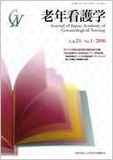Japanese
English
- 販売していません
- Abstract 文献概要
- 参考文献 Reference
抄録
本研究では,療養病床の看護師が急性期治療後の高齢患者の転入に関して困難を認識する状況と対処を明らかにするため,療養病床に所属する4人の看護師に半構成面接法によるインタビュー調査を実施した.
困難を認識する状況は【療養病床の機能・特性に関する家族の理解不足と不満】【急性期病床での今後を見据えた家族への支援不足と家族の不満】【生活機能が低下した状態での患者の転入】【急性期病床での不要ととらえられる身体拘束の存続】【急性期病床との情報共有の不足】【事前情報不足による想定外の治療やケアの必要性の判明】の6カテゴリーにまとめられた.対処は≪転入初期の家族の理解や不満の探索と解決≫≪転入時の患者の状態に応じた回復に向けた支援≫≪転入時の患者の状態に応じた臨機応変な調整と対応≫≪他職種と連携した急性期病床との情報共有の促進≫の4カテゴリーにまとめられた.
高齢患者が急性期治療後に療養病床で円滑な療養を開始するには,療養病床に関する理解と情報共有の促進,急性期治療によって低下した生活機能の回復を支援するケアの推進が課題と考えられた.
This study aimed to clarify issues related to the transfer of post-acute elderly individuals to long-term care wards. Semi-structured interviews were conducted with four nurses working on long-term care wards. The nurses were interviewed regarding situations in which they experienced difficulties related to the transfer of post-acute elderly individuals and the solutions they currently use to address these difficulties. Interview data were subjected to qualitative descriptive analysis. The results of the analysis revealed the following six situational categories: “family's discontent and lack of understanding regarding long-term care wards”, “lack of support to family for the future in acute-care wards and family's discontent”, “transferring patients in a debilitated state of health”, “persistence of physical restrictions that seem unnecessary in acute-care wards”, “lack of communication with acute-care ward staff”, and “requirement of unexpected treatment due to lack of prior information”. Furthermore, the following four treatment categories were identified: “discovery of and coping with the family's understanding and dissatisfaction during the early period of transition”, “supporting recovery in accordance with the patient's condition at transfer”, “resourceful adjustment and conformity with the patient's condition at transfer”, and “promotion of information sharing with acute care wards in cooperation with other professionals”.
For continued care and to facilitate a smooth recuperation for post-acute elderly individuals, it is necessary to promote an understanding of long-term care beds, share information for continuing care, and examine care methods to support recovery.
Copyright © 2016, Japan Academy of Gerontological Nursing All rights reserved.


